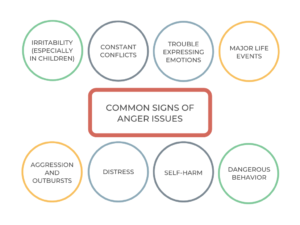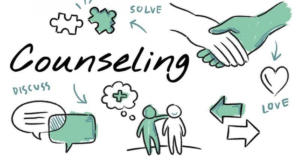Contents
Anger Management Therapy

Anger is a natural human emotion that can be triggered by many different things. However, if you want to avoid the negative consequences of unchecked anger. It’s important to find ways to manage your anger. One option is to invest in anger management therapy. Where you will learn skills and techniques on how to cope with difficult situations through methods such as deep breathing or meditation. Find out more about this type of therapy here.
Anger management therapy is normally used to treat people with anger issues. It’s a course of treatment that has proven effective in limiting the effects of bad temper and allowing patients to live happier, more productive lives. Anger can be triggered by many different things but if one does not want to suffer from the negative consequences of it. It would be best to look for ways to manage it. There are many different options but one is to invest in anger management therapy where one will learn skills and techniques on how to control anger through methods like deep breathing or meditation.
How Does It Work?
The first step is to understand your triggers. Anger management therapists will work with patients to determine the factors that trigger their anger, whether it is an emotional response or a reaction to the environment. A therapist will also help patients figure out what sets them off. For example, finding evidence of their partner’s infidelity might make one feel angry, but it could be due to the emptiness that person feels within themselves.
Once these factors are taken into account then anger management therapy can begin. The aim of the course is to help patients gain control over their anger and be able to express themselves in a healthy manner. At the same time, they will not hurt anyone but merely convey their emotions effectively. There are many tools that can be used to manage one’s anger such as meditation, deep breathing, reframing thoughts from negative ones to positive ones, seeking social support, and learning how to control impulses. These are just some of the many techniques that anger management therapists teach their patients.
Stages Of Anger Management Therapy
The course is normally divided into two stages. The first stage teaches patients how to understand where their anger comes from and what triggers it. This part also helps them learn about relaxation techniques as well as how to deal with their emotions in a healthy manner. The second stage sets out the various techniques that are beneficial for anger management, such as deep breathing or meditation. These are but some of the many tools used by patients enrolled in this course.
So if you’ve been suffering from uncontrollable anger issues then it would be best to find an anger management therapist to deal with this. You could find one near you by visiting the American Association for anger management.
Anger management therapies are aimed at individuals who have problems controlling their temper and emotions. To be able to limit the effects of violence you need to learn how to manage it rather than suppress it. This is done through methods such as deep breathing or meditation. Anger management therapies are also helpful for people who have mental health problems such as anxiety disorder, depression, schizophrenia, and bipolar disorder.
Figure Out The Reason For Anger

When it comes to anger management therapies you will first have to identify the triggers of your bad temper and realize what sets you off. One might realize that their anger is due to an emotional response to something or simply a reaction to the environment. Once these factors are taken into account then anger management therapy can begin. And one may learn skills and techniques that will help one deal with difficult situations like deep breathing, meditation, or reframing thoughts from negative ones to positive ones. At the same time they will not hurt anyone but merely convey their emotions effectively. The course is normally divided into two stages. In the first stage, people learn how to understand where their anger comes from and what triggers it. The second stage sets out various tools that are beneficial for anger management such as deep breathing or meditation.
The course is normally divided into two stages. The first stage teaches patients how to understand where their anger comes from and what triggers it. This part also helps them learn about relaxation techniques as well as how to deal with their emotions in a healthy manner. The second stage sets out the various techniques that are beneficial for anger management, such as deep breathing or meditation. These are but some of the many tools used by patients enrolled in this course. So if you’ve been suffering from uncontrollable anger issues then it would be best to find an anger management therapist to deal with this.
Benefits Of Anger Management Therapy

Anger management therapy is a form of therapy that concentrates on the cognitive, emotional, and behavioral responses to anger. It also teaches how to control these reactions in order to decrease the severity of the situation. Anger management therapy is usually utilized by people who have problems with anger management. But can be used for any person, no matter their age or gender.
One of the most common benefits of anger management therapy is its ability to teach people how to control their reactions and behavior in tense or difficult situations. By learning how to control these behaviors, it prevents the situation from escalating even further. And it allows both parties involved to resolve an issue more effectively and amicably.
A study conducted on anger management showed that participants had a reduction in aggressive impulses and violent thoughts after undergoing Anger Management therapy. Participants were also less likely to engage in physical assaults after completing the treatment. Additionally, successful completion of anger management has been shown to increase social assertiveness. Because individuals are capable of resolving problems without getting or upset (Safren et al, 2005). In the long run, this leads to a reduction in depression and anxiety. Because people are able to self-regulate their anger in all situations.
In addition to these benefits, some other benefits of Anger Management Therapy include:
- Decrease stress levels,
- Increase social skills and empathy towards others,
- Less likely to resort to violence when resolving issues,
- Lowered blood pressure and heart rate after treatment,
- Increased job satisfaction due to higher levels of interpersonal relations with colleagues at work.
Patients learn to help themselves remain calm and handle tense situations in a constructive, productive manner through anger therapy. These abilities might assist them to avoid anger suppression, which can lead to hypertension, depression, and anxiety.
Anger Management Therapy At Home

Anger management therapy involves a person in a therapeutic session with the therapist who works out the anger issues with them. A therapist is trained in various ways to deal with anger problems and they have different methods of confession. The sessions can happen at either the therapist’s workplace or at home.
It also helps people get more self-aware and be able to change the behaviors that are causing them to become angry. This can be done by recognizing triggers that cause anger to flare up.
Many counselors use talking therapies as a form of treatment for anger management problems. Talking therapies aim to help people work through their feelings, thoughts, and behaviors associated with their anger issues. By doing so, the counselor is also able to identify any factors which might be causing these issues and help develop ways to deal with them appropriately. This will involve discussing how you interact with others and helping you understand what events or situations are likely to trigger an angry outburst.
It’s possible that your counselor may recommend other types of treatment such as relaxation techniques or medication in order to manage your symptoms. However, counseling alone has been shown to reduce and alcohol misuse in people with anger management issues.
Approaches To Manage Anger
The therapist might use different approaches when helping you manage your anger, for example:
They may suggest that you keep a diary of any situations in which you become angry and write down how you reacted. This can be an uncomfortable process for some people. But it helps the therapist to identify triggers and come up with practical ways of dealing with these situations. So they’re less likely to cause problems in the future.
A study found that “75% of U.S. business leaders suffered from significant problems controlling their anger”. Anger management is vital for maintaining good physical health, interpersonal relationships, and also for the overall well-being of all individuals.
Breathing Exercises

Sometimes counselors will teach a person relaxation techniques such as deep breathing exercises or visualization which they can perform instantly when they notice their temper starting to flare up. However, practicing this technique takes time and patience. So often it is more successful if paired with distraction techniques such as going for a walk or listening to music until the anger subsides.
Another approach some therapists recommend is ‘assertiveness training’. This type of intervention can be used to help you communicate more effectively and feel more in control of your emotions. It can also teach you how to stand up for yourself without becoming angry or aggressive.
Confrontation Therapy
Confrontation therapy works by encouraging the individual to face their fears. Such as using ‘I’ statements that aim to make them less afraid of social rejection or conflict. And leave out any aggressive behavior that might result in losing a friendship or loved one. Many times anger management problems stem from people not wanting to hurt others’ feelings. So they hold back their true feelings which results in pent-up anger. By confronting this issue it helps with anger management. Because the person will look at the problem and not shy away from it.
The therapist will help you keep track of your progress by asking questions about how often you’re feeling angry, the triggers that cause these feelings, and how you’ve managed them. They’ll also ask you to rate your feelings using a scale or graphic representation to show degrees of anger (i.e. 0-100). This is important because it gives your counselor an idea of where certain issues lie in order to make improvements toward better anger management.
Counseling

It’s not uncommon for counseling sessions to be scheduled every week. But different therapists have different ways of working with their clients. So what other activities might be involved vary significantly between sessions. For example, some may involve other people being present while others might use role-playing or video feedback.
The counselor will try to challenge your thoughts and beliefs by asking you to consider alternative ways of seeing the situation. They might ask you questions about why you think certain things are true, how much control you really have over what happens. Or what other possible explanations there could be for a particular event. This may sound confusing at first. But it’s all part of helping you understand where your anger is coming from. So that in time it won’t take as much effort to control when it arises.
It may feel like difficult work but ultimately if you can learn to manage your anger with the help of a therapist. Then this skill will follow you into every area of your life improving how comfortable and confident you are in relationships both at home and at work.
W’s Of Anger Therapy
The first W is what, which can be either external stimulus or internal emotion. The second W is why, which is the cause of the anger like an event that happened or a feeling that you don’t like. The third W is when which is when the anger happened and how often it occurs. The fourth W is who; the people around you, friends, and family. Lastly, there are ways to deal with anger. It’s important to understand these ways so that you know how to handle it better next time. The ways to deal with anger are: “acknowledging your anger,” “staying away from the trigger,” and “taking a time out.”
Now that you know the W’s of anger management it’s time to find out ways on how to deal with your feelings. It states, there are five steps when dealing with anger. The first step is recognizing when you feel angry. Second, determine if the feeling represents a real danger. Third, you have to take a few deep breaths and understand what made you feel this way. Fourth, take some time by going for a walk. Lastly, after taking some time to cool down think about what made you upset. And how you might avoid the situation in the future.
Rules of Anger Management Therapy

The first rule is avoiding strong negative emotions because they could get out of control if not stopped. Second, never act irrationally or aggressively when angry. Third, always know your limits when feeling angry because knowing your limits will help control yourself better than before. Forth, there are many ways to cope with anger like listening to music, calling a friend for support, taking a walk in a park, etc. Lastly, remember it’s important to realize that everyone gets angry. But they can be controlled which is why it’s important to learn these rules on dealing with anger.
There are many risk factors of anger and they can include: “physical pain, depression, anxiety disorders or post-traumatic stress disorder (PTSD),” and many more. These risk factors can affect people of all ages. So it’s important to understand how your body is feeling when angry.
There are some benefits of learning the techniques on how to deal with anger. Such as: “positive coping mechanisms that promote growth,” and also “harm reduction”. Positive coping can help you feel less stress. Because coping with anger in a positive way will make you feel better. For example, if you’re struggling with addiction; harm reduction will work for you. Because instead of judging yourself for addiction you’ll accept who you are and how the addiction makes you feel making it easier for you to overcome the addiction.
Conclusion
If you are looking for affordable Online Counseling MantraCare can help: Book a trial therapy session. We have several experienced, licensed therapists who will help you attain good mental health and happiness. And will also help you get rid of any social anxiety, trauma, or fear.


